Adapted for the stage by Nia Vardalos, from the book by Cheryl Strayed. Co-conceived by Marshall Heyman and Nia Vardalos. A Queensland Theatre Production, in association with Trish Wadley Productions. Director: Lee Lewis. Belvoir Street Theatre. 1 Feb – 2 Mar, 2024
Reviewed : February 4, 2024
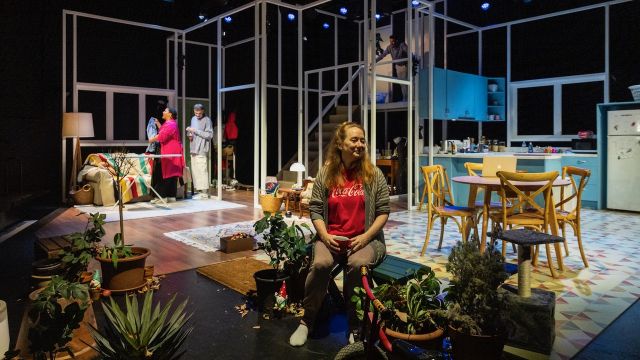
Cheryl Strayed’s book Tiny Beautiful Things was published in 2012. It is a collection of letters she received and answered, anonymously, and unpaid, in an advice column called “Dear Sugar” on an online literary website. Topics ranged from mundane questions to lifetime sorrows. When it was suggested to Canadian writer and actor Nia Vardalos that it might be adapted for the stage, Vardalos was astonished by the “raw and extraordinary candour” of both the writers of the letters and Strayed herself.
She managed to capture that ‘rawness’ and courage in her adaptation – and herself played the role of Sugar in its première in New York’s Public Theater in 2016 and again in 2017. It has since become one of the most produced plays in the world … yet, as transfer director Lee Lewis says, it is a play “like no other”.
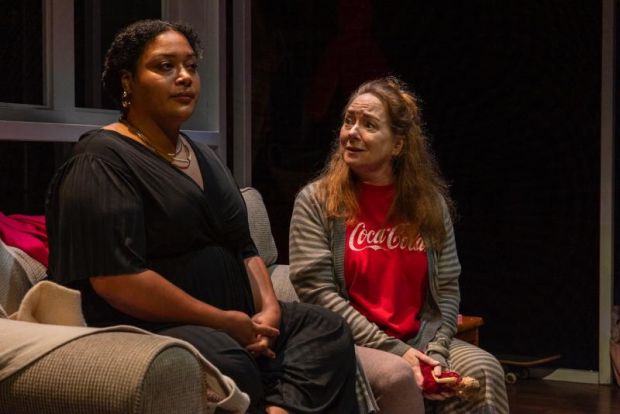
Because this play has no linear plot, nor characters that relate based on a ‘motivation’ or ‘objective’. There are no scene changes as such, no real conflict. There are no multi-media effects. Yet this play is a truly moving piece of theatre – one that reaches into very dark places where it shines the light of hope.
There are four actors. Sugar is the constant. The other actors become the many people of different ages and backgrounds who wrote to Sugar over the two years Strayed worked on the column. They don’t ever meet each other. Yet they connect in the most personal ways. The only play I have seen that compares in any way is Duncan Macmillan’s Every Brilliant Thing, because that too was different and took the audience into difficult places.
The set is Sugar’s home, where she answers the letters on her laptop. Designer Simone Romaniuk uses the framework of the open plan living room and stairs of a two-storey house. Just the framework. The walls are not clad. Nothing is hidden in this space. It is as open as the letters Sugar receives and the replies she writes. Littering the set is the accumulation of a family. Toys, dirty clothes, shoes on the floors. Appliances and crockery on the kitchen benches. Cat bowls on the kitchen floor. The freezer door left open. Games on the dining table – and Sugar’s laptop.
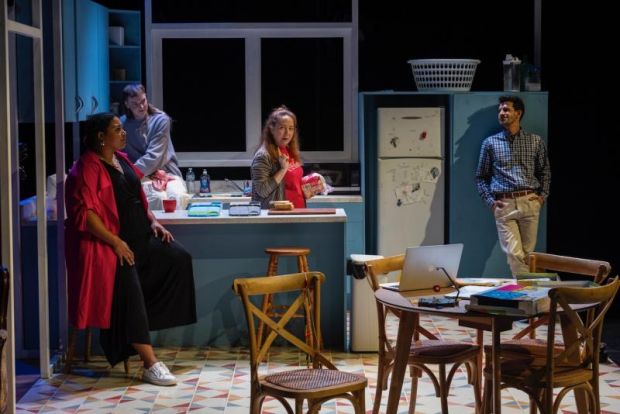
In this space Mandy McElhinney becomes Sugar. Stephen Geronimos, Nic Prior and Angela Nica Sullen are the letter writers, who move in and around the space, always on the stage, sometimes standing beside Sugar, or sitting on the kitchen as she tidies up, or drying the dishes she has left to drain.
They are still, silent, focused as Sugar answers a letter – then in a few short sentences quickly become one of the many people who sought advice. A wary teenager, a rape victim, a very angry man, a young Lothario, a grief-stricken father … never making eye contact, but always aware, as the letter writers themselves must have been as they searched Sugar’s replies for the one letter addressed to them.
McElhinney is constantly on the stage and constantly on the move – just as the multi-tasking mother, homemaker, writer, columnist she depicts. Moving to the laptop, but seldom sitting down, she ‘reads’ the writers in the words and style and tone they use. And as she answers, she goes about household tasks, picking up a pair of shoes here, or sniffing at a discarded shirt and stuffing it into a washing basket.
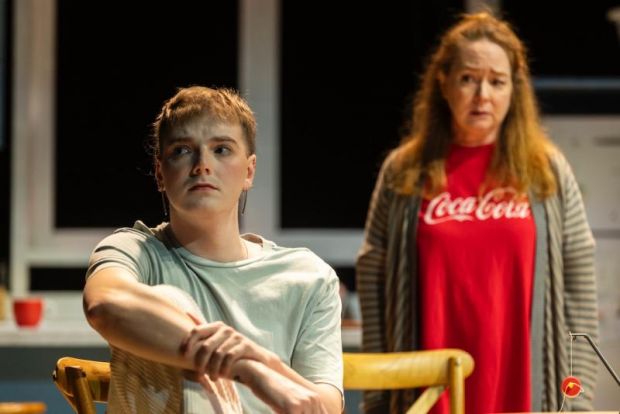
She stops at times, perhaps thinking of the right approach; or reacts quickly as if a specific word or phrase sparks a memory, then goes on picking up toys from the floor as she begins her answer; or stops mid-sentence to find the next word as she irons a martial arts uniform; or ponders over her last response as she makes the next day’s sandwiches and packs them into lunch boxes.
Obviously, every movement, every action, every change in her voice, every thoughtful expression, every painful memory, is strictly choreographed, yet McElhinney makes it seem perfectly natural – even remembering something she’s forgotten as she begins to climb the stairs to bed. Sugar is a beautiful role and McElhinney embodies every nuance of it.
Strayed’s answers to the letters are based on her own experiences – some are as moving and painful as the letters that prompted them. In them she references her mother’s death, her father’s rejection, her beastly grandfather, a red velvet dress trimmed with white lace … and shares the lessons she learnt from them …
“I’ve always written the column as if I were a naked woman standing in a field showing you everything but her face.”
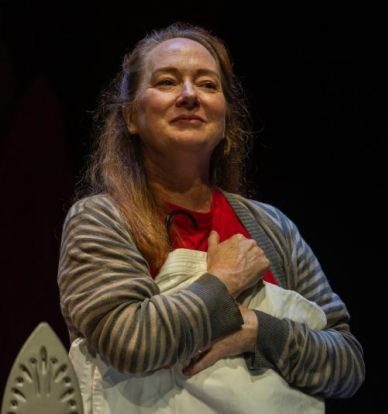
Mandy McElhinney makes every one of those references as deeply real as Strayed must have felt them.
Four actors. Never relating. Only once or twice almost touching. Yet there is electricity between them, a current that travels through the audience eliciting a sniff here, a tear wiped away there, an almost inaudible gasp – and many silent nods.
Cheryl Strayed’s advice continues to reach across the world in this very special Australian production of Nia Vardalos’ delightfully different play.
First published in Stage Whispers magazine